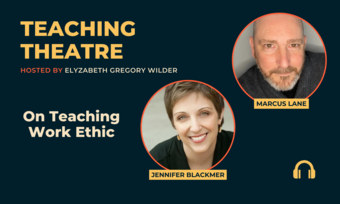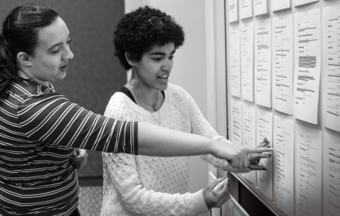We are all trying to take risks while being good stewards
This piece continues a partnership between HowlRoundand the League of Professional Theatre Women (LPTW). For many years, LPTW has been publishing an annual magazine, Women in Theatre (WIT). This year they’ve expanded the magazine to include an online format and are collaborating with HowlRound to provide content covering an array of issues and perspectives within the theatre, all highlighting women’s voices. The co-editors for this project are Eliza Bent and Alexis Clements. Look for bi-monthly content from WIT on HowlRound ranging from interviews to articles and blog responses. Find all WIT content here.
After reading the interview between Lynne Meadow and Gladys Chen, I’m first struck by how similar our stories are, as theatre-makers, despite differences in the location and budget size of our theatres. We are all trying to take risks while being good stewards. And the deeper layer of meaning attached to how women relate to one another, and our shared experience of juggling artistry and family resonates with me as well. I’ve had two children since I became artistic director of the Indiana Repertory Theatre (IRT) seventeen years ago, and I find the act of balancing all these needs to be part of what has made me a good producer. I’m always prioritizing—consciously and unconsciously. I think I prioritize in my sleep! But it often gives me clarity of purpose. I think neither Gladys nor I would have our jobs without the trailblazing work of Lynne Meadow, Zelda Fichandler, Ellen Stewart, and other women who were demanding a place at the men’s table a generation ago. Like Lynne, I had primarily male mentors early on.
Quite simply, I learned from Libby that women are predisposed to using their instincts to benefit their communities (whether that community is a family or a theatre company). We just have to develop those instincts by listening to people’s needs and calibrating them against the values of the community and artists we’re serving.
Tom Haas, IRT’s second artistic director and a former Yale professor, who hired me as the IRT’s first dramaturg, was my first mentor. He hired me directly out of grad school, before I had finished—another common thread between myself, Lynne, and Gladys (what’s that about, women?). While I learned a tremendous amount from Tom, it wasn’t until after his death that I found my first female mentor, Libby Appel (IRT’s third artistic director). Libby really modeled for me how women can lead with tremendous advantage. Quite simply, I learned from Libby that women are predisposed to using their instincts to benefit their communities (whether that community is a family or a theatre company). We just have to develop those instincts by listening to people’s needs and calibrating them against the values of the community and artists we’re serving. And certainly, having learned that, we are obliged to mentor those coming up behind us—male and female—to share those values and exemplify them in art.
Another aspect of Lynne and Gladys’ conversation that really struck me was this quote from Lynne: “I think we, as people who make theatre, have an obligation to maintain intimacy. There is nothing more intimate…than a night in the theatre.” While I hazard pissing off many of my male colleagues in this, I think women are uniquely skilled at the concept of crafting an intimate experience. Men have historically been the external empire builders, while women have maintained and legitimized the experience of human intimacy. We are less afraid of raw emotion; we are more willing to believe that an intimate emotional experience can be healthful, even instructive. I believe this everyday as I make theatre.
This connects with the fact that, demographically, women are our primary ticket-buyers at IRT. I can’t imagine that this trend isn’t true elsewhere. Men (straight men, at least) tend to be the willing or unwilling accompaniers of wives, dates, or daughters. Presumably this is because they are less proactive about seeking a live, emotional, intimate experience (at least in public!). But in my experience, men are often the most deeply impacted emotionally by a theatre event. Is this because they are reticent to put themselves in a place where their emotional life can be affected? And when that reticence is successfully assailed, do they have fewer emotional restraints? In any case, that’s enough of my gender speculations!
I enjoyed reading Lynne and Gladys’s shared conversation on a very rudimentary level because, where I live, I have few female colleagues—the nearest female artistic directors are in Chicago. And while I revile the denigrating terms too often used to describe the Midwest—flyover zone, etc.—there is a feeling of loneliness out here on the plains in our business. I’m lucky to have many wonderful female colleagues on the IRT staff, but the peer level conversations I have with other women in my city are with those who run museums and social service organizations. And I find that, as I get older, I am hungrier for more substantive conversations with women, not less. This is a bit of a mystery to me, but not an unsettling one. It certainly spurs me to mentor young women and delight in their ascension through our business. Kudos to Lynne for her generous mentoring work in our business and to Gladys for sharing her story with us.













Comments
The article is just the start of the conversation—we want to know what you think about this subject, too! HowlRound is a space for knowledge-sharing, and we welcome spirited, thoughtful, and on-topic dialogue. Find our full comments policy here